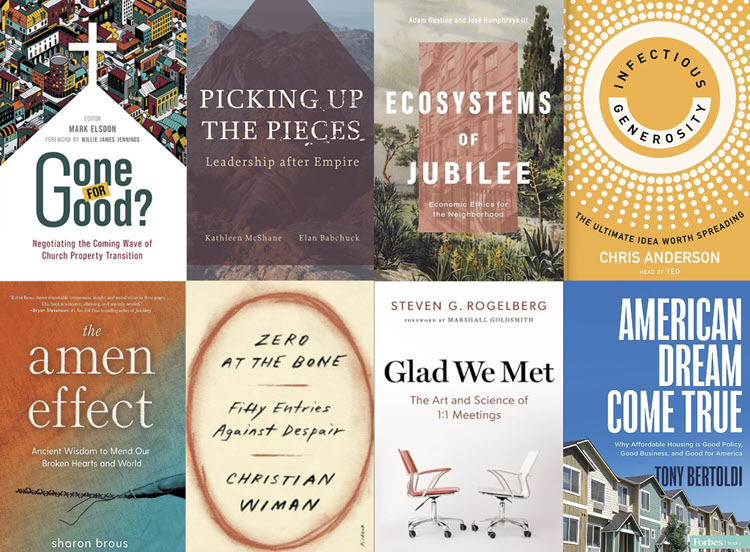The best books I’ve read recently that were published in either 2023 or 2024 are

- (5.0) Gone for Good? Negotiating the Coming Wave of Church Property Transition edited by Mark Elsdon (William B. Eerdmans, 2024)
- (5.0) Picking Up the Pieces: Leadership After Empire by Kathleen McShane and Elan Babchuck (Fortress Press, 2024)
- (4.5) Ecosystems of Jubilee: Economic Ethics for the Neighborhood by and Jose Humphreys III (Zondervan Reflective, 2023)
- (4.5) Infectious Generosity: The Ultimate Idea Worth Spreading by Chris Anderson (Crown, 2024)
- (4.5) The Amen Effect: Ancient Wisdom to Mend Our Broken Hearts and World by Sharon Brous (Avery, 2024)
- (4.0) Zero at the Bone: Fifty Entries Against Despair by Christian Wiman (Farar, Strauss and Giroux, 2023)
- (4.0) Glad We Met: The Art and Science of 1:1 Meetings by Steven G. Rogelberg (Oxford University Press, 2024)
- (4.0) American Dream Come True: Why Affordable Housing is Good Policy, Good Business, and Good for America by Tony Bertoldi (Forbes Books, 2024)
Gone for Good and Picking Up the Pieces
There are more than enough books about what is wrong with American church. Countless volumes describe what once was through near endless statistical considerations of the decline or through in-depth exploration of one of the many elements of the decline or of factors that have contributed to decline. A much smaller body of literature begins by stating the challenges facing the American church before going on to offer modest proposals for change that seeks to slow rather than reverse the decline. Very few books invite readers to explore new ways of being church that are innovative, life-giving, and future oriented. Gone for Good and Picking Up the Pieces are two new books that do more than aspire to contribute to this impactful emerging body of literature; both masterfully contribute.
Gone for Good is edited by Mark Elsdon, a Presbyterian (PCUSA) pastor who first appeared on So What Faith when I reviewed his first book: We Aren’t Broke: Uncovering Hidden Resources for Mission and Ministry by Mark Elsdon (William B. Eerdmans Publishing Company, 2021). [Notably, later that year I named it one of the two most impactful books published in 2021.] He’s back now with the first book he’s edited: a collection of essays by a wide variety of subject matter experts who provide unparalleled insight into the expansive options congregations have for divesting of their real estate holdings. With thousands of church properties worth billions of dollars being sold or repurposed each year the impact these transitions will have on their local communities and together on the nation is considerable. Gone for Good provides leaders of these congregations (and their judicatories and denominations) as well as prospective redevelopment partners considerable wisdom, including numerous examples of transition gone right that have or are in the process of making the desired long-term impact.
While I was familiar with some of the stories in Gone for Good most were new to me. One, however, was particularly familiar. Patrick Duggan, Executive Director of the United Church of Christ Building and Loan Fund, opted to highlight the Village @ West Jefferson in his chapter, “The Case for Missional Remaining Missional,” This incredible project was built in 2021 by the church affiliated Molo Village Development Community Development Corporation on land owned by the historic St. Peter’s United Church of Christ – land that is directly across the street from what had been one of the country’s largest public housing developments. This redevelopment effort has special meaning for me as a part of the United Church of Christ and as someone who was present for the groundbreaking on June 28, 2018. And, I was present because I was an Adese Fellow (a social enterprise fellowship) in a program created and facilitated by Patrick (for more, see My Experiences with 14 UCC Congregations).
Thanks to that fellowship, I had the opportunity to meet and learn from Rabbi Elan Babchuck, a spiritual entrepreneur who serves as Executive Vice President at Clal, the National Jewish Center for Learning and Leadership, and as the Founding Executive Director of Glean Network. Last month I was intrigued to learn that he had co-authored a book with a United Methodist pastor with a rich background in law and real estate development. As I turned the pages of Picking Up the Pieces I found it was both everything I needed and nothing I expected. Using the Moses story these two accomplished leaders and innovators unpack the underlying assumptions in the traditional pyramid shaped views of leadership that dominate our culture. This model is so widely accepted that language about it permeates leadership expectations in secular and religious contexts. From organizational charts with the senior most leader occupying the top of the pyramid like structure to the ordination process by which folks are called out and set aside for a special kind of religious leadership. In place of the great man (or great person) or the single leader, shared approaches to leadership should resonate deeply with people of faith. Great leaders never lead alone; they invite, develop, and empower others to lead in models and manners that bring to life shared leadership. Together this larger and continually growing group is well positioned to lead their group, organization, congregation, or business into the desired future.